Graham Reid | | 11 min read
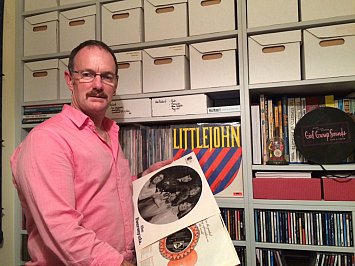
The most extraordinary thing about the extraordinary Colin Linwood is just how ordinary he is. In his early 50s, he's married with children, has worked from the time he left school, is trim and in good condition, and when he walks into the lobby bar of the Heritage Hotel in Auckland for a chat, few in the room give him a second glance.
He's an ordinary man . . . and at home he has . . . 24,000 records?
"Yes, 24,000 or something like," he laughs. "I have to do an estimate really, it's catalogued alphabetically by artist and in my head so I pretty much know where everything is.
"I'm trying to sift through stuff at the moment and going through a process of what albums I want to keep and what I want to get rid of because I've ended up with duplicates, foreign copies . .. so I've got about three or four thousand records and will put a spread sheet together and send it out to people I bought off on Trade Me.
"I've got too much. You can't really have too much, but I've got too much."
Linwood laughs when I say the "obsessive" word: "There's no doubt about it, that's being polite."
And something of the collector mentality driving it when he first started amassing his archive of vinyl?
"Yeah, there was some of that going on, I was utterly naïve about what I was doing so I was always a hoarder, but a tidy hoarder. Everything was in order. It's the easiest way to find things."
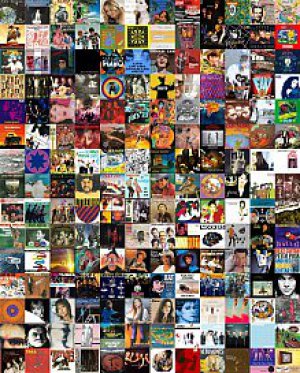 Colin Linwood's name only came to my attention in the past couple of years when Chris Caddick of recordedmusic.co.nz started telling me about the project to get as much New Zealand music available online as possible.
Colin Linwood's name only came to my attention in the past couple of years when Chris Caddick of recordedmusic.co.nz started telling me about the project to get as much New Zealand music available online as possible.
But of course many of the original shellac and vinyl records -- on 78rpm, singles and albums -- were either hard to find or impossible to locate.
Enter Linwood who, after years of collecting records almost at random, had a New Zealand music epiphany and decided he would try to collect everything he could by New Zealand artists.
For recordedmusic.co.nz, Linwood was one of the go-to guys.
But his story is not only interesting because of how he got into music, but also because he has a clear-eyed view of collecting music. He actually listens to the records and doesn't just file them away.
"If you can't get to listen to them what's the point?
"But yes, I work a day job so it can be hard to listen every day. I probably do listen most days, but not every day. Some days I go home and do nothing.
"I have all the international LPs in a collection and I would have listened to every one of them, at least half of one side.
"Sometimes I'll listen three or four times and think, 'Do I actually like this, why do I like this when it's got bad reviews?” But I like things for many different reasons, and it's personal taste."
Oddly enough Linwood grew up in a home in northern Central Otago where there was very little music. His dad, a farm worker, had an accordion but that rarely came out, and there was "a valve radio on the shelf and I can remember being woken up to listen to the rugby, like the All Blacks tour in Britain, in the middle of the night. But I can't remember music from the radio".
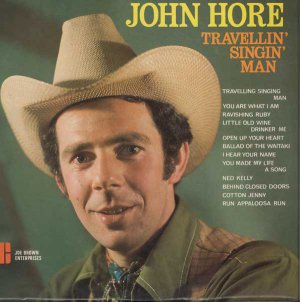 His parents liked country music and would buy Music World records by artists like John Hore and Jim Reeves "which my father would listen to more so than my mother, but it never stirred my blood".
His parents liked country music and would buy Music World records by artists like John Hore and Jim Reeves "which my father would listen to more so than my mother, but it never stirred my blood".
So music was not part of his life?
"Not then. Not at all."
That all changed quite suddenly a few years later when the family moved and were living in Seddon. The son of the bus driver who would take the kids to school was Linwood's age and was into music. One day when they were in the 4th form the friend came around and brought some records.
"I think my parents were out and he brought Deep Purple, Led Zeppelin and Black Sabbath.
"Black Sabbath didn't do anything for me and Deep Purple I thought was alright, but Led Zeppelin was the one because I'd never heard aything like that. It was Led Zeppelin II, it had Black Dog on it.
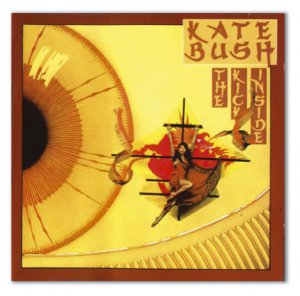 "I worked at the local Yamaha dealership selling motorbikes to the local farmers and made some money and when I went over to Wellington one time I bought a cassette, it was Kate Bush's Kick Inside. And I got the two Beatles [red and blue] compilations. They were my first purchases."
"I worked at the local Yamaha dealership selling motorbikes to the local farmers and made some money and when I went over to Wellington one time I bought a cassette, it was Kate Bush's Kick Inside. And I got the two Beatles [red and blue] compilations. They were my first purchases."
When he moved to Welllington one of the flatmates had a turntable he let Linwood use, so he started going to Silvio's record shop and every week would put $90 or $100 from his pay-packet aside to buy records.
By his own admission -- and this was the early Eighties - he was fairly directionless in what he would buy, just albums he'd heard about, things like the Steely Dan, the Eagles and Fleetwood Mac when they came out, the Beatles and the Stones of which he'd "buy one or two and if I liked them I'd see what the others sounded like".
He reminds me that at the time there was very little music writing to give him a direction but he'd read Rip It Up (although New Zealand music wasn't on his radar), would rely on flatmates for guidance, the people at Silvio's ("they took a shine to me because I was a good customer") and the volumes of the Rolling Stone Record Guide.
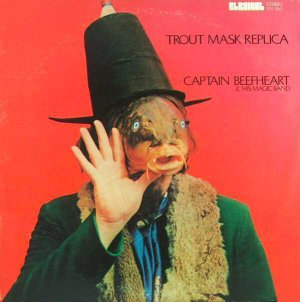 "They had a star rating and I'd use that, so if they said it was good it usually was. Although if they said it was bad it didn't mean it was actually bad.
"They had a star rating and I'd use that, so if they said it was good it usually was. Although if they said it was bad it didn't mean it was actually bad.
"I could never get into Captain Beefheart's Trout Mask Replica, that had five stars, but I never to this day understand why it is so highly rated.
"I've had two or three copies over the years and I'd be thinking that maybe I'd grown up a little so would try it again, but I never got why it was highly rated. I have other records by him, but not that.
"I don't have every Beatles album if you count Yellow Submarine as an album which it technically was. But that doesn't do it for me, although it had Hey Bulldog on it. And I don't have every album by the Rolling Stones, maybe only half, I don't have a lot of their later albums.
"Their first three albums were a hotchpotch of British, American and New Zealand pressing with different songs on each, but I have copies of all of those different pressings."
And it was New Zealand pressings which interested him increasingly: they were unique, were on thick vinyl "even though the frequency range was a bit low on dynamics", and came in thick cardboard covers . . .
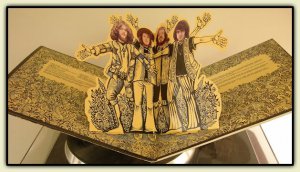 But sometimes in covers like Jethro Tull's Stand Up, which didn't in the cheap New Zealand edition.
But sometimes in covers like Jethro Tull's Stand Up, which didn't in the cheap New Zealand edition.
"Yes, but it makes them quite unique and interesting," he laughs.
Linwood's collection of international albums can be patchy, he admits, because he only buys and keeps what he likes: he has a few reggae and jazz-fusion albums, only Brian Eno's first three albums, the first three by Yes ("I get lost by Tales From Topographic Oceans") and the first four Fairport Convention albums but not so much Steeleye Span: "Fairport was closer to the pop rock market".
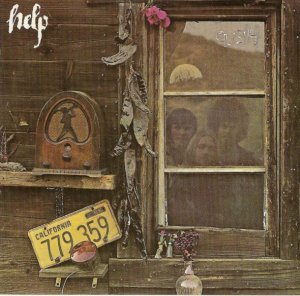 "I probably bought most [international] albums that people know, I don't have any Can albums now, they don't do it for me. But there's a band from America called Help – great harmonies, incredible players. Not many people know of them, I played it for Nick Bollinger and he said if I ever found another copy to let him know.
"I probably bought most [international] albums that people know, I don't have any Can albums now, they don't do it for me. But there's a band from America called Help – great harmonies, incredible players. Not many people know of them, I played it for Nick Bollinger and he said if I ever found another copy to let him know.
"It's a brilliant album and I found it because I have bought some collections, and some pretty big collections, over the years. I paid $40,000 for one collection, just under 10,000 records, a combination of albums and 45s".
Although that collection included duplicates of what he already had, Linwood sold or traded them and over seven or eight years so the purchase paid for itself.
If his international collection is driven by keeping what he likes rather than to complete a series ("no Bob Geldof solo albums, I bought one and I didn't like it, it had lost that [Boomtown Rats] edge") it is his collection of New Zealand music which is remarkable and a national treasure, albeit one stored in his home.
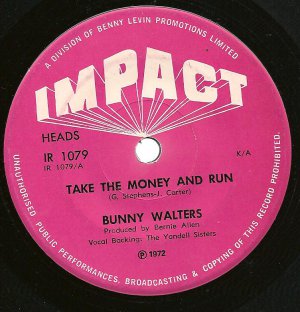 "I do try to collect everything [from New Zealand] because I'm trying to preserve it, so yes, I have Bunny Walters, I have all the albums and singles by him unless there's something I haven't been able to find. And I have a list of what I am missing."
"I do try to collect everything [from New Zealand] because I'm trying to preserve it, so yes, I have Bunny Walters, I have all the albums and singles by him unless there's something I haven't been able to find. And I have a list of what I am missing."
He has all of guitarist Peter Posa's albums ("because they are New Zealand I will have them all, as well as his overseas pressings, there are French pressings") and Gray Bartlett's ("I've got a Japanese pressing of his album and a picture sleeve copy of his single") as well as MOR artists like the Yandell Sisters, Mark Williams, Kim Hart and Tina Coss.
Although Sixties music and Fifties rock'n'roll are his personal passions, he likes pop music as well as rock: "There's a bit of a high brow attitude towards pop, it's not the dirty side of things, but it sells and people sing and dance to it."
Linwood -- who says he knows of others with larger collections than his -- can remember his epiphany about New Zealand music with clarity.
"I was in an orange 1600 Datsun with my flatmate going to get some groceries and Shona Laing's 1905 came on the radio. It was a really catchy song and Les said, 'You know that's from New Zealand' and I thought, 'No, we don't have pop and rock music' because I hadn't heard it.
"This was about 1981. I'd probably heard She's a Mod or something but I hadn't clicked. That was the first time I realised we had these pop songs that were actually hits, and there was no Stranded in Paradise at that time."
He recalls hearing Barry Jenkin/Dr Rock on radio play Sixties music one night and he heard the La De Da's, Dave Miller and the Byrds . . .
"It was very fresh because I'd never heard it before."
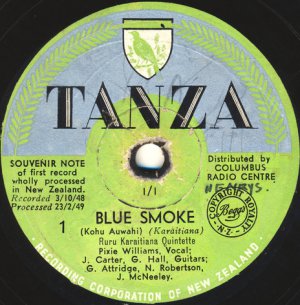 So he began to collect singles at a time when shops would put them out in order ("there's no respect now," he laughs) and progressively -- obsessively even -- started to amass New Zealand music on 45s and albums, and every now and again a 78rpm.
So he began to collect singles at a time when shops would put them out in order ("there's no respect now," he laughs) and progressively -- obsessively even -- started to amass New Zealand music on 45s and albums, and every now and again a 78rpm.
Of course he has Blue Smoke on TANZA 1 ("but it's not that rare") and Johnny Cooper's Pie Cart Rock and Roll, Rock Around the Clock and See You Later Alligator: "I have all three covered by vinyl as well".
"The 10” Johnny Cooper album has got Rock Around the Clock on it, See You Later Alligator came out on 45 . . . so that was 1956, which is when I believe the first 45s were printed in New Zealand. Pie Cart Rock and Roll is very hard to find.
"There was also single on a label called Ace, one single reputably a test pressing acetate of Sam Matapouri and His Rocking Rockers, is it very lo-fi but it is real rock'n'roll.
"I think I have about 50 boxes of New Zealand singles with about 140 in each box so we are under 10,000 singles and EPs."
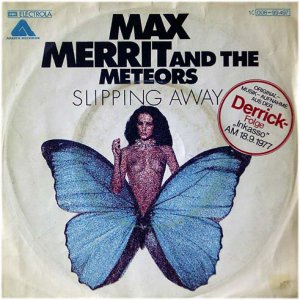 Linwood is a pragmatist who admits there is always something you don't know and he's learning all the time. He's discovered New Zealand music released overseas, like Max Merritt having picture sleeves in Germany, the Fourmyula's Otaki being popular in Germany, "and I've got an Argentine version of their Home single [from '69] with a completely different B side."
Linwood is a pragmatist who admits there is always something you don't know and he's learning all the time. He's discovered New Zealand music released overseas, like Max Merritt having picture sleeves in Germany, the Fourmyula's Otaki being popular in Germany, "and I've got an Argentine version of their Home single [from '69] with a completely different B side."
Doubtless the band had no idea of its existence.
He's sure a lot of New Zealand music was released in South Africa also, and he has a Turkish copy of the Avengers' first album in a washed photocopy of the cover: "I've got two copies actually, the first I bought on E-bay and it was in okay condition and then a friend who was a big collector sold me one".
"There are Japanese copies of Streettalk and Mark Williams, and it's interesting to find these things. I'm sure there are things that have been released I'll never know about."
Of the price, he notes Ragnarok records would go for hundred of dollars but now they're hard to sell because most people who want them have got them: "It's supply and demand."
One of the rarest New Zealand records is the Littlejohn album – a pre-Blerta band with Corben Simpson and Bruno Lawrence.
"I loaned Chris Caddick a copy so they could remaster it for the 200 albums they have done so far and I have not seen too many other copies. It sometimes turns up but if I compare it to say Bari and the Breakways' second album I've probably had 10 copies of that, and that is considered a rare album.
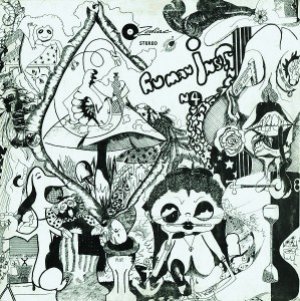 "Snatmin Cuthin, the Human Instinct album is pretty hard to find on vinyl. If I didn't have it, now I would go up to $1000 for it, maybe higher depending on what the pressure [from other bidders] was and how flushed I was with cash."
"Snatmin Cuthin, the Human Instinct album is pretty hard to find on vinyl. If I didn't have it, now I would go up to $1000 for it, maybe higher depending on what the pressure [from other bidders] was and how flushed I was with cash."
Linwood keeps apace with as much as he can although acknowledges there are some gaps in his Flying Nun collection ("most in the mid period when I was probably concentrating on something else").
And New Zealand hip-hop?
"Yes, I collect it all, all the dance stuff that came out . . . but I don't know it intimately and I still have some there waiting to be played at least once.
"Nothing gets filed away until I've listened to it because there could be a gem in there, something that just makes the hairs stand up on the back of my neck.
"I like hearing new sounds, and if it makes me dance then even better.
"Record are meant to be played. They are art but they are not meant just to be looked at.
"There are people who collect obssesively . . . although I do collect by [catalogue] numbers because I had to to know what came out in New Zealand. But I file them by artist, not number or record label.
"When Roger Watkins put out his book on the Wellington scene I got in touch and if I'd known him before I could have helped him with his discography and filled in some of the gaps.
"When he did his second book about Auckland I put the discography together. I made a couple of mistakes . . . but if you don't know, you don't know.
"It's hard to explain why you collect some things and not others, but a song is an easy thing to collect.
"I haven't got everything," says this extraordinary and ordinary man, "but it's getting hard for me to find something I haven't!"
.

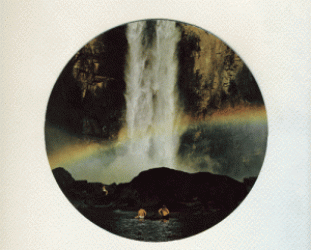
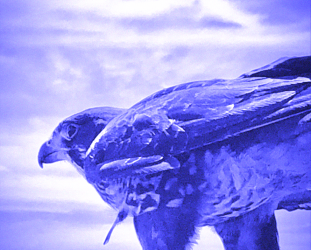
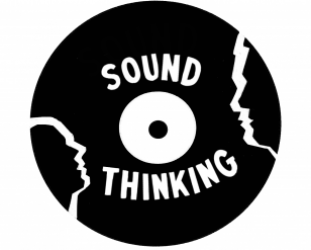

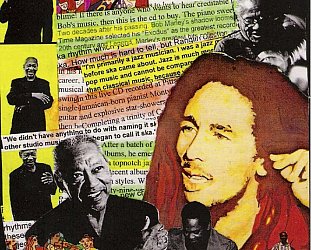
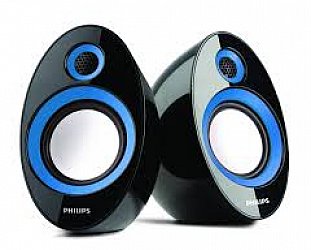
Graham Hooper - Jul 1, 2014
I once had 1000 records and hundreds of 45's that I left in Nelson almost 100 Reggae, Blues,Hard rock, Folk, Comedy,and New Zealand ,1960's Rock n Roll, etc covering many diverse genres ....I donated them to a Nelson Radio Station (Radio Fifeshire?) in the Mid 1980's before they went onto computer playlists and stopped playing records ...I had some great Albums Triple album of Yes Songs Live. Concert for Bangladesh, George Harrison and friends, l had Split Enz Mental Notes and the Laser disc they released as well as Waiata (Corrobarrie? was the Aussie version.) they had one release with different coloured covers . after moving to Auckland I started again I remember Push Push had a Swirly Coloured Vinyl album of Trippin? each record had its own unique pattern .
SaveOften NZ pressings never had the great covers of the Imported albums colour front but B+W back or inner Gatefold section.
post a comment